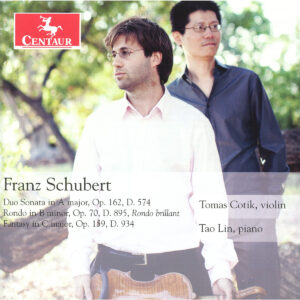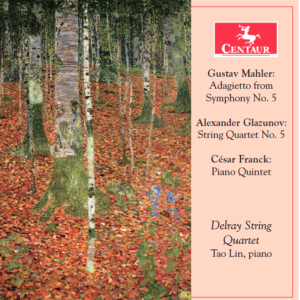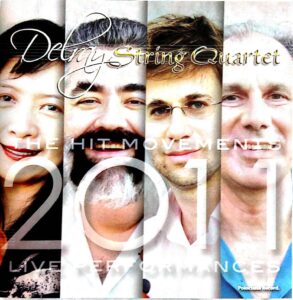Booklet notes
Schubert lived in a time of war, bombardments and occupancy of Vienna by Napoleon’s army, the dissolution of the Holy Roman Empire, and political oppression. The rich, artistic life of Vienna and the vitality of its musical life sometimes makes one forget those difficult circumstances. Music provided distraction at those times; as entertainment, it might have actually helped the general populace cope better with the repressive police state ruled by Emperor Francis, whose reign covered Schubert’s entire life. Music was also heard at church as well as in public concerts. There was music everywhere in Vienna.
Francis was the head of the House of Austria, which included approximately the area of today’s Austria, the Czech Republic, Hungary, Croatia, Slovenia and bits of Poland, Belgium and Luxemburg. France declared war on Austria a few weeks into the beginning of Francis’ reign in 1792. This began a period of more than two decades of wars that spread though different continents. The first seventeen years of Schubert’s life (b. 1797) were marked by these wars and their consequences. Among these consequences were anxiety, poverty, and a confined cultural life.
Twice during the Napoleonic wars, in 1805 and 1809, Vienna suffered occupation by French troops, with their associated difficulties. Schubert was eight and twelve years old respectively. Life in Vienna was particularly difficult after the Treaty of Schoenbrunn was signed in 1809, after Austria tried unsuccessfully to fight Napoleon. In 1812, Napoleon’s defeat was celebrated by Beethoven’s Wellington’s Victory and Schubert’s Auf den Sieg der Deutschen (On the Victory of the Germans, D. 81. On April 15, 1814, after Napoleon’s abdication, the allies entered Paris and Schubert wrote his song for bass, Die Befreier Europas in Paris (The liberators of Europe in Paris, D. 104. From September 1814 to June 1815, an International Congress convened in Vienna to restore peace and order in the aftermath of the Napoleonic wars.
There were no major European wars after the Congress of Vienna (1814-15, and this coincides with the period during which Schubert composed most of his works. “Tranquility and Order” was the motto of this period, and Austria was known for the omnipresence of police surveillance, political repression and suspicion of even the slightest unorthodox idea. The police state had actually started much earlier and also paralleled the war with France.
The Biedermeier was a period when Viennese society was turned inward, to home and family, and to innocent nonpolitical activities, as a distraction from the oppression of that repressive police state. At this time, Hausmusik (music in the home) was in ascendance. These gatherings were the most common venues for music at the time and were cultivated by the educated middle class. There were very few families who did not appreciate being entertained by chamber music, which was mostly performed in gatherings of family and friends and in private salons.
Besides these house concerts, music could be heard at public concerts and the theater. Schubert, in contrast to Beethoven, lived mainly among the middle class and was the only true Viennese among the composers of the first Viennese School. His music was mostly performed in the intimate company of informal musical gatherings centered about him, which were called Schubertiaden. His circle of friends also held reading evenings, evenings of dancing, party games, and countryside trips. There was also a more serious side to this group, especially around 1820, a time when Schubert and some of his friends shared a nonconformist attitude toward life and art and considered the norms of their society hypocritical. Therefore, they celebrated egalitarianism and intellectual honesty. Even Franz Schubert was arrested at this time, with his former schoolmate Johann Senn, when they were suspected of being members of an outlawed student organization. Schubert’s dissatisfaction with the regime was evidenced by his involvement with the secret Unsinn-Gesellschaft (Society of Absurdity, which staged original plays and published members’ newsletters that ridiculed contemporary politics, scientific discoveries, drama, and literature.
Read More



